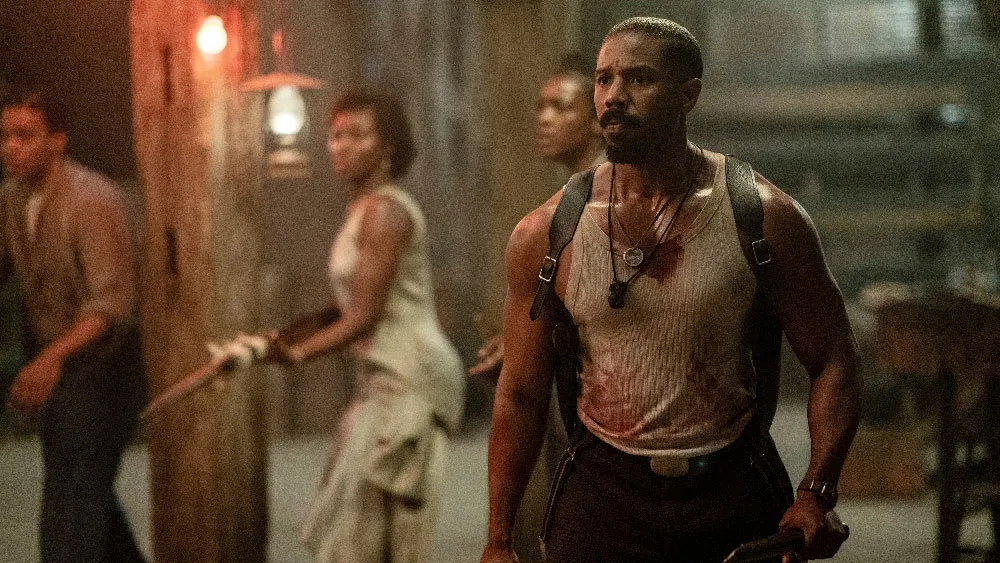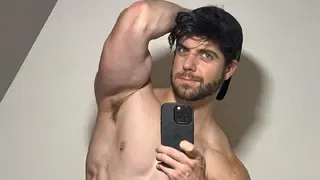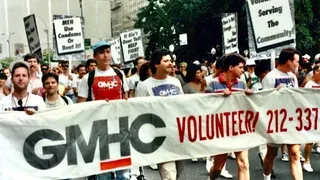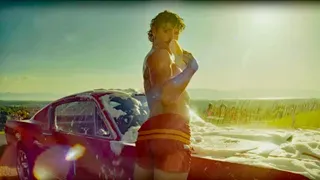August 10, 2006
Sweetness and Light: EDGE Chats with Jeff Mann
Kilian Melloy READ TIME: 15 MIN.
Jeff Mann is something of a triple threat in the world of gay letters. An Assistant Professor of creative writing at Virginia Tech, Mann authors memoirs, poetry, and short erotic fiction.
Reading his work, it's clear that Mann's loves are few, but profound: rugged men, an equally rugged stripe of sexual sharing, the potency of the written word to engage deep-seated emotions that lay well beyond any pleasingly pretty arrangement of phrases. Being from the Appalachians, Mann also demonstrates a love for that region's cuisine, praising it with rapt reverence not only in his verse but even in his BDSM stories (the first tale in Mann's new collection of erotic short fiction features a pan of cornbread that the characters enjoy to give them strength for their rough play).
But his most penetrating love is for poetry. Even Mann's prose is poetic, and when it comes to writing poetry, his stanzas are just as erotic as any well-penned story of sexual heroics, as with these lines from his poem "Fantasia in the English Garden," included in his newest collection, On the Tongue:
We scatter ourselves like black locust pollen.
Still gasping, hearts slowing, I dip my forefinger
into molten quartz he's spattered on the faucet,
I lift droplets like blood or maple sap to my lips.
As I taste, the silver in my beard begins to darken.
To Mann, then, poetry, manhood, rites of male intimacy - these are all the very stuff of life. But his works don't exist simply to titillate; consider this line from "Monster," a ballad about an encounter in a sauna that is also included in On the Tongue:
The purpose of perfection?
To teach us longing.
To make us monsters.
This is not the sweetness and light of foamy poetry composed only of sparkles and metrics. Sweetness, yes: but the sweetness of honeysuckle or wild mint. And light, surely: but kind of light that teases out every crease and crevice in the poet's face, a hard edged and truthful light rather than the sort that softens and flatters. Little wonder then that his poetry has drawn comparison to the likes of John Keats, Emily Bronte, and T. S. Eliot.
Jeff Mann recently engaged in an email correspondence with EDGE about his background, his writings, his two new books, and his love of all things Appalachian.
EDGE: A History of Barbed Wire is a collection of erotic fantasies. In your memoir, Loving Mountains, Loving Men, you talk about having the sword of Aragorn hung up on your wall. Does fantasy - erotic, or heroic, or of any sort - play a larger part in the gay psyche than in the heterosexual's? If so, does that result from the political power gap between straights and gays?
Jeff Mann: Well, I can only speak for myself - fantasy has always played a huge role in my life. But I suspect I'm speaking for many members of many oppressed minorities when I admit that my fantasies, like seedlings springing from a crack, grow in the space between the world as I am given it and the world as I would have it. Big damned gap there for most folks, but especially for LGBT people and other minorities who get a lot of grief from the hostile majority. So fantasy obviously serves as a way to create alternative worlds - more exciting, more gratifying, more erotic, more just. The Aragorn / warrior fantasies for me are ways of imagining a more just world... and a simpler world, where I can mow down homophobes (whom I often call orcs) without the inconvenient trammels of the law. I say in Loving Mountains, Loving Men that my ideal paradise would be one in which I could take revenge on those who cross me and mine and in which I could ravish any man I pleased. So of course, with that attitude, I'm going to be attracted to warrior or erotic fantasies. Sex and violence: nothing new about those interests.
EDGE: You enjoy literature of different warrior cultures - Viking, Old English, and so on - and your own poetry reflects a deep respect for nature: the strength of rock, of roots digging into earth, and so on. Would you say you strive for a sense of strength in your work? Is that an aesthetic preference? Are you perhaps celebrating homosexuality's outlaw status and refuting cultural stereotypes that associate homosexuality with weakness?
Jeff Mann: I'm a fairly butch guy who's always been attracted to butch guys, so of course I would valorize many aspects of traditional manhood. Strength is certainly part of that constellation of elements that compose manhood for me. (However, I've got to add here that I also very much admire female strength, which is often more in evidence in daily life than mature male strength. Strong women have immeasurably enriched my life.) I was a shy, timid, weak, unsure adolescent, and I've spent most of my adulthood trying to strengthen and harden myself, to cultivate courage for whatever trials might come. I want to be able to protect myself and those I care for. So, yes, I write about and think about strength a lot - whether it's the merely physical strength that allows me to lift weights or the more important emotional strength that allows me to stay by a deathbed until a loved one is gone. And much of the strength I've striven to achieve has been in direct response to the homophobic nature of mainstream society. When I read and delight in warrior literature, whether it's The Iliad or Beowulf or The Saga of the Volsungs, I'm looking for role models, ways of being brave in the face of adversity. So, whether it's reading sagas or learning to box or publishing queer poetry and prose or being defiantly out in rural America, I am indeed trying to prove to myself and to the world that gay men are not weak. Hell, if we were weak, none of us would survive under the hateful pressures brought to bear against us. And, ironically, as much as I've patterned myself after butch men - I'm a big, tattooed, goateed, mountaineer who wears camo, cowboy boots, and baseball caps, drives a pickup truck, and collects knives and swords - I'm beginning to believe that effeminate men, drag queens, the transgendered, those who do not subscribe to traditional gender roles as I do - they are the bravest, the strongest, of all.
EDGE: What is it about rural areas - and I take it Appalachia is this way also - that causes the people who live there to be less tolerant toward minorities of whatever sort? I would have thought living closer to nature than city residents do would encourage country dwellers to appreciate the diversity of nature, whatever form it takes: skin tone, gender, sexuality, outlook.
Jeff Mann: What causes intolerance in Appalachia is the heavy hand of fundamentalist Christianity. These mountains are infested with any number of homophobic religious denominations. And fundamentalists of any sort believe their way is the right way and that other folks need to toe the line or else. Detestable creatures... I think I've learned to hate them as much as they hate me and my kind. I know that many people would say that meeting hate with hate isn't the right response, but, to use the local dialect, "I cain't hep it." I hate as deeply as I love.
EDGE: Many people probably don't realize (I certainly did not) that the mountainous countryside of Appalachia constitutes its own American subculture. Your work references pickup trucks, country music, political conservatism - but my home state of New Mexico, much of which is high plains desert, could also be described in these terms. What precisely makes Appalachia its own cultural niche?
Jeff Mann: Well, I used to teach Intro to Appalachian Studies and Appalachian Folk Culture here at Virginia Tech, and so I've thought a lot about such issues. Certainly rural cultures everywhere have a lot in common. As you point out, pickup trucks and conservatism are not restricted to the Highland South. I suppose what makes Appalachia unique is what makes any culture unique: its folkways, which is to say its language, its sayings, proverbs, legends, tales, foodways, arts and crafts. Some of this folk culture has been shaped by the landscape (what scholars would call environmental determinism: your environment shapes what you are), some by the ethnic history of the region. We have a rich mix of Scots / Irish / English / German bloodlines, with strong Native American, African-American, Eastern European, and Italian influences as well. The writer Loyal Jones has a great essay called Appalachian Values in which he captures some of the best aspects of the region. He lists, among others, love of place, self-reliance, hospitality, familism, a sense of beauty. That essay's a great place to start for anyone wanting to get a good sense of this region. I know that my ornery individualism, clannishness, and fatalism are certainly mountain traits. Carrie Kline, in her readers'-theater work Revelations: Appalachian Resiliency in Gay, Lesbian, Bisexual, and Transgendered People, illustrates her belief that Appalachian traits like independence, toughness, and resiliency actually help us mountaineer queers survive. However, Loyal Jones also mentions religion - it's the first trait he discusses, actually. So we're back to what makes life for queers in Appalachia especially difficult and besieged: the sanctimony of the pious.
EDGE: You mention in Loving Mountains, Loving Men that mining companies meet at least a token resistance from Appalachian people. Has that changed with the mining companies making plans to raze the tops off 7% of the mountains in the Appalachians to get at the coal? Or are the economics of the situation such that Appalachian residents find this acceptable?
Jeff Mann: Well, the very few people who might get to run those goddamn machines that slice off the mountaintops find MTR (mountaintop removal) acceptable. Most of the rest of us Appalachians find the practice disgusting, offensive, and loathsome. MTR employs so few people, and its environmental consequences are enormous. Many a destructive practice is tolerated in West Virginia because, oh Lord, "it creates jobs!!" What shortsightedness. I've heard painful, poignant, moving testimonies from folks like Larry Gibson and Maria Gunnoe, whose lives have been entirely wrecked by the coal companies' greed. Hell, those companies have been tearing the heart out of Central Appalachia since the late 1800s. They don't give a damn what kind of mess they leave behind, as long as they make their piggish shareholders sufficient profit.
So, to put all this more calmly, there are a few people in Appalachia - those who might profit-who approve of MTR, but many, many natives of the mountains object strenuously and are doing all they can to stop the destruction.
EDGE: Being a musician yourself, and having some appreciation for the roots of folk music, is your love of country music an extension of your love of folk / mountain music? (Does your love of certain country music stars proceed from this also?)
Jeff Mann: Yep, I would say that my country-music enthusiasm relates to my love of folk music. American country music and mountain music have certainly been strongly influenced by Scots and Irish culture. (The film Songcatcher is an interesting take on all this.) Not only am I a big Celtic buff, I like well-written, poignant lyrics, beautiful melodies, and simple acoustic guitar, all of which are found in contemporary country music, in songs recorded by Tim McGraw, Chris Cagle, Keith Urban, Mary Chapin Carpenter, Nanci Griffith, Kathy Mattea, and the Dixie Chicks (whose politics I especially admire: they bravely point out what an idiot Bush is). However, I must admit that my love of certain country-music stars involves not only my appreciation of their music but the fact that they themselves embody the physical type I find most attractive: dark, goateed, muscular, hairy country boys dressed in jeans, boots, and cowboy hats. The kind of men I grew up around and have modeled myself after.
EDGE: Turning the topic to one of your two newly published books, there's a fair amount of bondage present in the stories of A History of Barbed Wire. How does bondage work, exactly, for those of us who are unfamiliar with it? Your descriptions are tender even though some of the acts entailed seem cruel.
Jeff Mann: Ah, well, I've spent a lot of space in my fiction trying to figure out that aesthetic, trying to understand the attraction. Gay male bondage has a lot to do with beauty and strength in restraint, in extremis, the ways in which manhood is reasserted in both giving up power and taking it. I love strength, as we've discussed - and there's no gesture stronger than for the strong to willingly give up power. I think of BDSM as warrior sex, as a test of toughness and endurance. You mention tenderness. It is that vacillation between cruelty and tenderness - making a man helpless and hurting him, but also taking care of him and protecting him - that composes the fascination. And I'm versatile enough to appreciate this passion from both ends of the spectrum. Some of it for me, since I'm a pagan, is a spiritual re-enactment of the Sacrificed God, of which Christ was only one of the more recent manifestations. A lot of my enthusiasm for leathersex is simply about intensity, experiencing extremes that root us more solidly in our own bodies. I hope this is making some sense. BDSM is like a mystery religion: you can't really explain it, you have to experience it, since it's beyond any logical interpretation.
EDGE: May I ask if pain is a part of that rite, or that sacrament? Is pain part of the objective - pain being, of course, a complement to pleasure, maybe a form of pleasure if offered in the right way?
Jeff Mann: For some aficionados of BDSM, pain is not a part of the experience. For others, pain is appreciated and savored. For some, the power-exchange is enough. For others, suffering while being restrained sweetens and deepens the sense of helplessness.
EDGE: I saw the cover for A History of Barbed Wire. Wow! Is that you?
Jeff Mann: Damnation, I love that cover. When Greg Wharton and Ian Philips of Suspect Thoughts Press sent me that image, I howled with appreciative lust. "Finally a publisher who understands marketing!" said my partner. I still have the JPEG on my computer's desktop to open and admire with regularity. Naw, that isn't me. Wish it were... though I guess I resemble the cover-stud a little bit. Same approximate age, same silvering beard, same furriness.
EDGE: Though you have written some fiction, most of your writing is poetry or memoir. What attracts you to those forms of writing in particular?
Jeff Mann: Poetry is my first genre, the one I'll always come back to. I like the brevity of the lyric, the intensity of it, its insistence on emotion in a world that encourages us to be not emotional and self-aware but simply efficient. I love the compact way in which poetry tells the truth, makes the personal universal. In memoir, I'm telling the truth too, but there's more room to mingle ideas with emotions, since prose doesn't have to be as dense and brief as poetry. And I think there's a courage to poetry and memoir that fiction doesn't always have. Which is to say, fiction is, by definition, untrue, though of course it reveals a sort of truth in its "lies." Memoir is supposedly true (though most writers of creative nonfiction embroider a bit - I certainly do), and the kind of poetry I write - influenced by those early idols of mine, Sylvia Plath and Anne Sexton - is very much autobiographical and honest too. Fiction, or at least my fiction, is a refraction; poetry and memoir are reflections.
EDGE: I have to say, what I especially enjoy about your memoir writing is that you don't need to relate outrageously horrible events - drug addiction, murder, rape, all the tropes that more sensational (and more dubious) "memoir" writers seem to focus on lately. You find plenty to say that is moving and even urgent in the everyday miseries that all gay men - probably a lot of straight men too - can identify with immediately.
Jeff Mann: Well, thank you for that observation. I've noticed that memoirs that are receiving much, much more attention than mine are certainly full of sensational elements. Often I've thought - a little bitterly, got to admit -"Well, hell, I need to get myself an addiction or something. Then maybe folks would buy my books." I don't have addiction, murder, child abuse to write about. My life has been, compared to many, fairly placid... other than a long and painful slew of romantic debacles before I met my present partner nine years ago. Lost love and unrequited love are a fine, fine mine for poems, that's for damn sure.... though it's a minor mode that gets aesthetically tedious after a while.
EDGE: Your other new book is a volume of poetry titled On the Tongue. You yourself have commented that your poetry avoids sentimentality. That's true: there's a roughness about the poems in On the Tongue sometimes - not in execution or skill, but in tone and approach: a kind of texture that seems meant to be brisk and not satiny. I'd also characterize those poems as capturing a freshness of spirit, a directness and honesty - even while the images and phrases are often ringingly beautiful. Is this another example of how you pursue strength, by avoiding any hint of the saccharine or the merely pretty in your verse?
Jeff Mann: Thanks for this observation too. Nothing about me is saccharine or pretty, so my work shouldn't be either. However, the subjects of my poetry - lost love, family, home, nostalgia, evanescence and mortality - very, very often skirt sentimentality, and friends over the years (especially my colleagues Lisa Norris and Katherine Soniat) have been very helpful in saying, in response to drafts, "Okay, you're a little over the top here. Pull back." Whenever a writer's dealing with painful emotion, it's easy to slip into excess, into sentimentality. I try to handle such material with a matter-of-fact, stoic tone (which, yes, you're right, is a way of pursuing strength). One critic, to my irritable amazement, even said that, because of this tone, my poetry was ineffective in conveying emotion, even though intense emotion is just about all my poetry is about. I don't think he much likes autobiographical poetry. Lots of folks don't these days. They prefer something intellectual, oblique, wry, sapless. I call such stuff "dicking around with language." Waste of time, in my opinion... though that variety of verse is certainly getting the accolades my work never has.
EDGE: Writing poetry involves considerable emotional self-disclosure, and writing memoirs calls for honesty regarding the facts of one's life, including mistakes or roads you might wish you'd not gone down. Do you find yourself hesitating before putting certain episodes or observations out there for the general public?
Jeff Mann: I do hesitate. But then I remember what one of my idols, Dorothy Allison, emphasizes in her wonderful book of essays Skin: be honest. Exposing myself in my writing is sometimes uncomfortable, yes. But I think honest writing helps readers come to terms with their own conflicts and shames. At least that's what e-mails I've received from my readers indicate. The poems, stories, and essays I've read that have helped me survive have been brutally honest: about loss, self-hatred, loneliness, the ambivalent complications of sexual desire. That art has made me feel less alone, less like an isolated freak or monster. Feeling exposed is a small price to pay if I can help readers in the same way that I have been helped by writers who have come before me, folks like Felice Picano, Andrew Holleran, Patricia Nell Warren, Sylvia Plath, Anne Sexton.
EDGE: When it comes to writing erotic fiction, do you have to inhabit a different mind-set - an artistic or professional mind-set - before you can put down the details of your erotic imaginings?
Jeff Mann: A different mind-set? Naw, simply because most of my writing, poetry and prose, is suffused with some element of the erotic. My fiction just concentrates it. And I like to think that my stories include, along with open (and usually kinky) sexuality, all the elements that make good writing: effective use of allusion, plot, characterization, setting, etc. In other words, the same things I'm accustomed to striving for in my less erotic works.
EDGE: Are there times you feel the need to leave things out because, say, your mother might be reading this at some point?
Jeff Mann: Well, my mother, grandmother, and favorite aunt are all dead, so their perceptions of my erotic musings aren't a factor any longer. What's left of my family, they simply don't read my spicier materials - they're too busy, they're not interested, or I just don't tell them about it.
I try to resist the temptation to leave sexual elements out of my work because I'm sick of America's erotophobia. Why should a piece of writing be regarded as less skillful or less important artistically because it is frank about sexuality? Especially queer sexuality, or BDSM sexuality. My erotic writings are a defiant response to the conservative political atmosphere in America today... a sort of "Fuck You!" to the fundamentalists. Suspect Thoughts Press is publishing A History of Barbed Wire, and I'm very proud to be published by that press - they're publishing edgy queer material that most American publishers don't begin to have the balls to publish.
EDGE: The academic environment in the States has gotten to be a bit more constrained and severe in recent years. Does this affect your teaching style or the material you might bring into the classroom? Do your writings have a political impact on your university career?
Jeff Mann: I very much resent that constraint. What ever happened to academic freedom? Still, I teach pretty much what I want to teach, because I'm a member of a very liberal, supportive department, thank God. I introduce the works of gay and lesbian authors and many Appalachian writers into every course I teach, just to extend my students' minds. As for my own writing, well, the members of my department knew what they were getting when they hired me in 2003 as Assistant Professor of Creative Writing: a guy who specializes in writing very frankly not only about mountain culture but gay passion and sexuality. I'm very thankful that the double diversity I represent - "the hillbilly queer" - is something that my department, my college, and my university value.
Kilian Melloy serves as EDGE Media Network's Associate Arts Editor and Staff Contributor. His professional memberships include the National Lesbian & Gay Journalists Association, the Boston Online Film Critics Association, The Gay and Lesbian Entertainment Critics Association, and the Boston Theater Critics Association's Elliot Norton Awards Committee.







